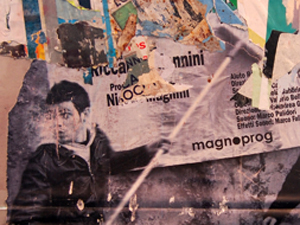There are four themes that weave their way through the research thread on Mobilisations, Interventions, and Cultural Policy in this issue. First, there is concern with intervention—intervention into the politics and practices of social movements and intervention into the academy and its traditions of knowledge production. Second, each text is situated firmly within a recognition and appreciation of social movements as knowledge producers. Third, all three contributions are unequivocally located in an urban context and the contemporary condition of inhabiting the city. Finally, what emerges from each reflection is a commitment to militant research and practice, as one that keeps ever-present an awareness of the relationship of research to existing material social relations of power and a commitment to confronting and transforming these very relations.
Mobilisations, Interventions, and Cultural Policy
Urban Interventions / Intervenzione Urbane
Urban Interventions is a series of collages by Alexander Dellantonio that take the urban terrain with its rapid changes as the matrix of inquiry, presenting the artists reflections on the city. The strong colours used by the artist echo the city’s images, places, people and situations and tattered billboard posters and manifestos torn off the buildings the militants fly-posted them on are reassembled to show the city and its inhabitants in movement. Dellantonio appropriates parts of the city and seeks to return them to the spectator. In so doing, these works not only engage the urban terrain as a space of politics, they also raise questions about mediation in the context of the current crisis of political representation that is being expressed by movements across the world, whether for example in Tahrir or Syntagma Square, at Occupy Wall Street or during the public sector strikes in the UK.
Commentary on “Urban Interventions / Intervenzione Urbane”
Gavin Grindon responds to ‘Urban Interventions / Intervenzione Urbane’ by Alexander Dellantonio.
Commentary on “Urban Interventions / Intervenzione Urbane”
Begüm Özden Firat responds to ‘Urban Interventions / Intervenzione Urbane’ by Alexander Dellantonio.
Postcool
Francesco Salvini asks what it means to translate the categories of postcolonial thought in the practices of organisation of a subaltern neighbourhood trapped in the hurricane of valorisation and abstraction of urban space. Salvini presents an analysis of what he calls an ‘audio-visual inquiry’ conducted by a collective of political activists organising in the Raval in Barcelona. The laboratory of Postcool sought to find ways to learn about the subaltern histories of the Raval that are made invisible. Salvini discusses the ways in which the collective investigated how these subaltern histories of the Raval inscribe themselves in the urban design of the city in their relevance for organising against gentrification in the context of postcolonial capitalism.
Response to “Postcool”
Sandro Mezzadra responds to “Postcool” by Francesco Salvini, reflecting on the “method” of militant research the use of Chakrabarty’s concepts in Salvini’s understanding of “postcolonial capitalism.”
Nanopolitics: A First Outline of Our Experiments in Movement
The London-based nanopolitics group formed around a desire to think politics with and through the body, organising movement, theatre, and somatic based workshops and discussions. Using the term ‘nanopolitics’ to describe a political engagement that is attentive to the body, the nanopolitics group engage in a first reflection about their project in the text that appears here. They pose a series of questions that emerged from the project and engage in a collective reflection on their work with the body and movement, making a first foray into theorising their practice and its relevance.
